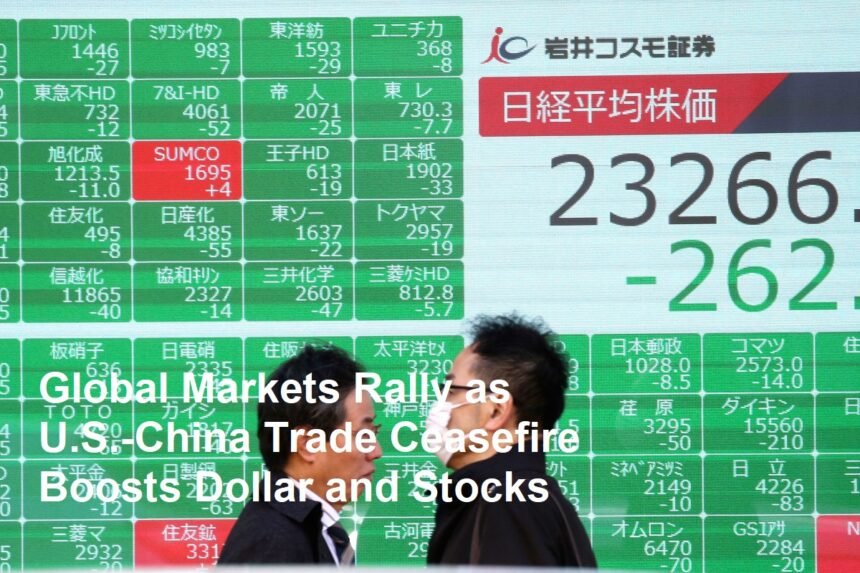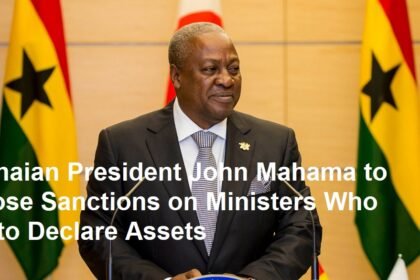On May 13, 2025, global financial markets responded with enthusiasm and optimism following the announcement of a 90-day ceasefire in the ongoing trade war between the United States and China. This unexpected truce, which includes significant tariff reductions by both countries, has led to a surge in investor confidence, a strengthening of the U.S. dollar, and widespread gains across stock exchanges worldwide. The positive market reaction underscores the critical role that trade stability plays in shaping economic sentiment and highlights the interconnectedness of global financial systems.
The trade war between the U.S. and China, which began in 2018, has been a major source of uncertainty and volatility in international markets. Over the years, escalating tariffs and retaliatory measures disrupted supply chains, increased costs for businesses and consumers, and dampened economic growth prospects. The recent agreement to pause hostilities and reduce tariffs—cutting U.S. additional tariffs on Chinese goods from 145 percent to 30 percent and China’s tariffs on American products from 125 percent to 10 percent—has been welcomed as a crucial step toward restoring stability.
One of the immediate effects of the ceasefire was the strengthening of the U.S. dollar against major currencies. Investors often view the dollar as a safe haven during times of uncertainty, but in this case, the dollar’s appreciation reflects renewed confidence in the U.S. economy and the prospects for improved trade relations. The reduction in trade tensions alleviates fears of prolonged economic disruption, encouraging capital inflows into U.S. assets such as government bonds and equities. This inflow supports the dollar’s value and signals a more favorable environment for investment.
Stock markets around the world reacted positively, with major indices turning green after weeks of volatility. In the United States, the S&P 500, Dow Jones Industrial Average, and Nasdaq Composite all posted notable gains as investors embraced the prospect of reduced trade barriers and improved corporate earnings outlooks. Technology and manufacturing sectors, which had been particularly vulnerable to tariff-related disruptions, saw significant rebounds. Similarly, European and Asian markets, including the FTSE 100, DAX, Nikkei 225, and Shanghai Composite, experienced upward momentum, reflecting the global nature of the trade conflict and the widespread relief at its temporary de-escalation.
The positive market response can be attributed to several key factors. First, the tariff reductions directly lower costs for companies that rely on cross-border supply chains, improving profit margins and encouraging investment. Second, the ceasefire reduces the risk of further escalation, which had previously weighed heavily on business sentiment and consumer confidence. Third, the agreement creates a window for more comprehensive negotiations, raising hopes for a durable resolution that could foster long-term economic growth.
Financial analysts and economists have noted that the ceasefire’s impact extends beyond immediate market gains. By reducing uncertainty, the agreement helps stabilize global trade flows and supports economic recovery efforts that have been challenged by inflationary pressures and geopolitical tensions. The improved outlook may also encourage central banks to maintain accommodative monetary policies, further bolstering market confidence.
However, while the market’s upbeat reaction is encouraging, experts caution that the ceasefire is temporary and that significant challenges remain. The underlying issues driving the trade war—such as intellectual property rights, technology transfer, and market access—still require detailed negotiation. Investors remain watchful for signs of progress or setbacks during the 90-day period, understanding that the path to a comprehensive trade agreement is complex and uncertain.
In addition, geopolitical factors and domestic political considerations in both countries could influence the durability of the ceasefire. Market participants are aware that any breakdown in talks or renewed hostilities could quickly reverse the recent gains. Therefore, while the current sentiment is positive, prudence and vigilance remain essential.
In conclusion, the announcement of the U.S.-China trade war ceasefire and the associated tariff reductions have sparked a wave of optimism across global financial markets. The strengthening of the U.S. dollar and the broad-based rally in stock indices reflect renewed investor confidence in the prospects for economic stability and growth. This development highlights the profound impact that trade relations have on market dynamics and underscores the importance of diplomacy in resolving complex economic disputes. As the 90-day ceasefire period unfolds, the world will be watching closely to see whether this fragile truce can pave the way for a lasting and constructive partnership between the two economic giants.









